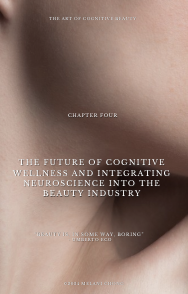The Birth Of Cognitive Beauty and How to Flex Your Beauty Muscles

What is Cognitive Beauty?
A cognitive process refers to the mental operations involved in receiving, storing, transforming, and using information. When processing beauty, our own various cognitive processes come into play. Perception allows us to detect aesthetic features such as symmetry, colour harmony, and proportions. And it is absolutely different for everyone as an individual. So, its time to get off of that hot-girl hamster wheel or the hot-boy hamster wheel. There is no ideal aesthetic cookie-cutter, there is no universal standard for beauty for people to live up to; it's mostly subjective and unique to each of us.
Things that catch our attention directs our focus towards visually and pheromonal (hormones/scent) and intellectually pleasing stimuli while memory retrieves past experiences of beauty for comparison and evaluation. Emotion and impression play a significant role, influencing our subjective judgments of beauty. Higher-order cognitive functions like reasoning and decision-making help us interpret and appreciate beauty in cultural contexts, art forms, and personal preferences, ultimately contributing to the complex and multifaceted experience of our own perception of beauty. And our perception is always evolving as we experience new stimuli and develop a kind familiarity with repetitive stimuli.
When processing beauty, humans engage in intricate cognitive processes that involve sensory perception, emotional evaluation, and cognitive appraisal. Visual stimuli are first received and interpreted by the brain, where features such as symmetry, proportion, and complexity are processed. Emotional responses, including feelings of pleasure or awe, are triggered by the brain's limbic (emotion/smell/behaviour) system, intertwining with memory and personal experiences to shape subjective perceptions of beauty.
Additionally, cognitive judgement mechanisms or tendencies can enable individuals to contextualize beauty within their own learned cultural norms, social constructs, and personal preferences, further influencing their perceptions. Let's remember that these preferences can be unlearned and overridden by re-programming our cognitive experiences to align with ever changing cultural practices. These complex interactions between our sensory input, emotional response, and cognitive evaluation collectively contribute to the multifaceted experience of beauty.
Cognitive Beauty refers to a new intersection of psychological well-being and aesthetic experiences, looking closely at the impact of our own perception of beauty on our cognitive processes and mental health. This concept recognizes that the concept of beauty is not merely a superficial or aesthetic concern but can significantly influence our overall well-being. The integration of cognitive and emotional aspects with the use of Neuro Facial practices in beauty treatments has gained attention for its potential benefits to mental health.
How Can You Flex Your Beauty Muscles?
The skin acts as a sensory organ, transmitting and receiving information that influences the nervous system and overall physiological homeostasis. This intricate connection is essential for understanding neurocosmetics and the brain-skin relationship in skincare. These interactions between all of these faculties modulate cell properties and skin functions and overall health of your skin.
The skin produces and responds to neurotransmitters, which are chemical messengers synthesized by nervous fibers and skin cells. Physical, chemical, or emotional stimuli like fear, happiness and sadness can trigger the release of these neuromediators. Among the 200 known neuromediators, about 25 have been found in the skin.
Neurocosmetics is an emerging field that explores the connection between the nervous system and skin. The skin is innervated (powered by active nerves) by sensitive nervous or neuro-vegetative (autonomic) fibers from the spinal cord, which modulate our bodies various functions like thermoregulation (heat/sweat), sebaceous (oil) secretion, and melanogenesis that gives our skin pigment and protection.
Stay tuned for more on this exciting new field in beauty!
Also in MC2 BLOG

Welcome to The Future of Neuro Beauty
The understanding of Cognitive Beauty opens new possibilities for beauty treatments that go beyond surface-level aesthetics and delve into the underlying neurobiology of beauty and the diverse world of aesthetics.

Your Skin Is A Quantum Communicator
Your skin is a sensory force field, constantly receiving and emitting powerful signals. It’s how you interact with the world and how the world interacts with you.
Your skin is a quantum communicator—it picks up vibrations, temperature changes, even emotional energy from others - Melani Chong

The Skin - Brain Axis - How It works
Melani Chong Neuro Beauty Expert ::: The Skin-Brain Superhighway
Did you know your skin and brain have a hotline to each other? Yep, they're chatting 24/7 through a superhighway of nerves and biochemicals. Stress, mood, and even how well you sleep can affect your glow-up game.
Because understanding this connection gives you the power to take control of your skin's story. Managing stress, sleeping well, and using neurocosmetic ingredients can help keep both your mind and skin in harmony.

